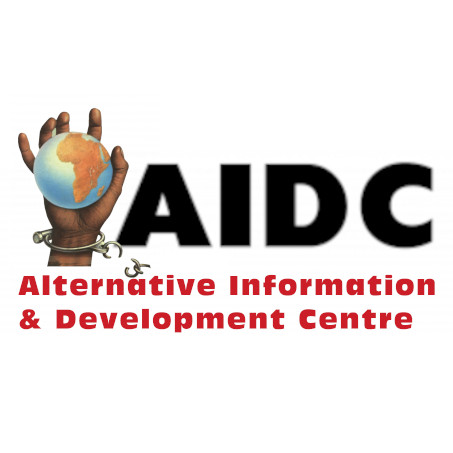On the 6th and 7th of February community activists from South Africa and Swaziland gathered in Cape Town to strategize ways to challenge extractivism and to speak out against the violence inflicted onto human rights defenders and activists by the state and unknown, dangerous assailants against the backdrop of the Africa Mining Indaba.
From the 6th to the 9th of February, transnational mining corporations from around the world gathered in Cape Town for their annual Africa Mining Indaba. The purpose of the Indaba is to serve as a platform for these corporations to promote extractivism and to discuss how they will continue to thrive and profit in the mining sector while millions of people continue to suffer the severe widespread social, ecological and economic consequences of destructive mining and extractivism.
The Africa Mining Indaba took place at a time when southern Africa experiences severe ecological crisis and its people are disproportionately affected by rising temperatures and other climate-related disasters. This is in addition to the extreme and persistent socioeconomic inequalities that already exist and the lack of public infrastructure that could help mitigate the devastation caused by rampant extractivism.
The promotion of destructive mining through events such as the Africa Mining Indaba advances the extraction of mineral resources such as coal, natural gas, mega-dams, including large-scale monoculture fields, and the extraction of marine resources for profit. It is clear to transnational corporations that the centuries of eco-social devastation and destruction are but, necessary causalities in the name of development – a means to an end.
We, people from community-based formations, social movements and human rights activists who have come together under the umbrella of the Right to Say No Campaign and the People’s Dialogue, see the Mining Indaba as an anti-poor event that pushes to pursue an agenda of the mining capitalist class, an agenda that depends on export-led growth models supported by extractivist and commodity economies.
We gathered to expose the alliance between mining corporations and anti-democratic regimes that are well known and documented in Southern Africa and elsewhere; at the expense of local communities and the environment. It is no coincidence that politicians in power are often climate change denialists and promote unbridled mining, defending and supporting extractivist capital, while at the same time claiming that they are committed to the so-called just transition. All under the guise of new ways to “save” our ailing planet.
Resistance to extractivism and anti-democratic regimes by activists is met with intimidation, persecution, and, in some cases, which are becoming more common, the assassination of activists and leaders of those standing up to power.
Despite this onslaught, we will not tire of exposing their agenda; their accumulation of wealth and power at the expense of the livelihoods and lives of the people in our communities who are being stripped of their land and resources for the enrichment of the few.
The number of our comrades who have had their lives violently taken for resisting transnational corporations and anti-democratic regimes in our region is staggering. In recent years, leaders of movements such as Abahlali baseMjondolo, Amadiba Crisis Committee and others have been assassinated. Most recently, on 21 January 2023, our colleague, comrade and champion of freedom and democracy, Thulani Maseko, was brutally gunned down in the presence of his family in Swaziland.
We cannot and will not remain silent. While expressing our solidarity with the democratic forces in Swaziland, we continue to call for an independent investigation to hold the killers of Thulani Maseko accountable. We demand an end to the state-sanctioned violence and repression, for releasing all political prisoners, and for democratising the country so that political plurality can prevail in Swaziland.
Our actions will not be limited to saying no to extractivism. We are committed to developing sustainable peoples’ alternatives and propose a popular socio-economic project that puts people and the environment first, rather than prioritising greed, destruction and profit. Our campaign will also build, on a more political level, a truly alternative people’s process to the Africa Mining Indaba, where people’s voices are heard and alternatives to extractivism can be developed and presented to the masses of our people in the region.
A luta continua! Viva Right to Say No! Viva People’s Dialogue!
The post Right to Say No Counter Mining Indaba Report: A Just Transition Away From Minerals Energy Complex appeared first on AIDC Alternative Information & Development Centre.






